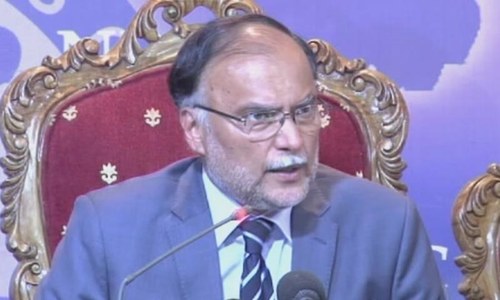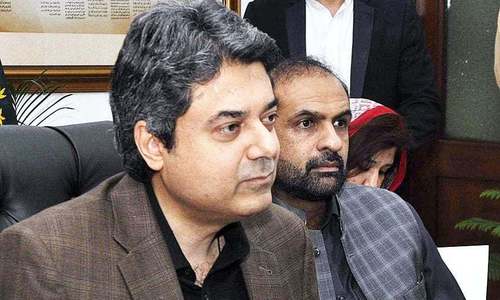LAHORE: All present in the special court for control of narcotics substance were caught by surprise when presiding judge Masood Arshad announced in the middle of Wednesday’s proceedings on a bail petition of former law minister Rana Sanaullah Khan in a drug case that he had been asked to stop working through a “WhatsApp message”.
“I have just received a message on my WhatsApp. I have been stopped from working and my services have been repatriated to the Lahore High Court,” the judge told the lawyers for defence and prosecution standing behind the rostrum the moment he returned to the court after a one-hour break.
The judge had taken the break after Anti-Narcotics Force (ANF) prosecutor Rana Kashif Saleem said he would require an hour or so to prepare his arguments as he had been entrusted with the case just a day back. Defence counsel Zahid Bokhari and Azam Nazir Tarar had almost completed their arguments before the break.
“I am answerable to Almighty Allah only and decision would have been on merit irrespective of who is involved in this case,” said the judge announcing his recusal from the case.
The judge adjourned the hearing till Sept 7 and also extended judicial remand of ex-minister Khan.
Ministry repatriates services of two other judges to LHC amid WhatsApp controversy
“What happened today is unprecedented,” said Advocate Tarar talking to the media outside the courtroom.
“The government is now deciding from which judge it wants to get a case heard,” he said questioning the manner in which the trial judge was stopped from working.
The arguments were almost concluded and the government withdrew the services of the judge in the middle of hearing, Mr Tarar wondered, saying it was an attack on the independence of the judiciary. He urged LHC Chief Justice Sardar Mohammad Shamim Khan to take a stern action in this regard.
Advocate Bokhari said the ‘cowardly act of the government’ established that the case against his client was nothing more than a concocted story.
On his way back to jail, the ex-minister facing trial in the drug case told the media that the government had been trying to silence the opposition with false cases. He said the government wanted the judges of its choice to hear cases against the opposition. “It is now evident ANF has nothing to prove against me,” he added.
In a letter written to the LHC registrar on Aug 26, the federal law ministry said services of district and sessions judge Masood Arshad had been repatriated. Through the same letter the services of judges of two accountability courts — Mushtaq Elahi and Naeem Arshad — were repatriated as the ministry sought new nominees for the posts.
“I am further directed to request your good-self to forward panel of suitable judicial officers, eligible in all aspects to enable the law and justice division to further process their appointments with competent authority,” said the letter.
Judge Naeem Arshad was seized with cases of Ramzan Sugar Mills against Leader of the Opposition in the National Assembly Shahbaz Sharif, his sons Hamza Shahbaz and Suleman Shahbaz. He had also been hearing Chaudhry Sugar Mills case against PML-N vice president Maryam Nawaz and her cousin Yousaf Abbas.
Sources in the LHC establishment confirmed that the ministry’s letter had been received, but they said no decision had been taken so far due to unavailability of the chief justice in Lahore for a couple of days.
Previously, the law ministry had requested the LHC on July 12 to retrieve services of CNS Judge Masood Arshad. The law ministry without consultation with the LHC chief justice had stopped the judge from working as special judge CNS, stating that “reportedly the said judge has issues regarding his impartiality and integrity”. The law ministry then in the letter to the LHC registrar said: “It is, therefore, recommended that the matter may be placed before the Hon’ble Chief Justice LHC to immediately retrieve the services of above said judge and nominate another district and sessions judge for appointment as judge in the said court”. However, the LHC had not taken his services back and he continued to hold the court.
“The judge, however, was not repatriated to the court until the LHC chief justice issued a formal direction in this regard,” said federal Law Secretary Arshad Farooq Fahim.
He said the LHC administration on Monday responded to the law ministry’s letter of July 12 and subsequently, the law ministry formally posted the judge back to the LHC since he belonged to the Punjab Judicial Service.
In response to the news regarding the sudden transfer of the judge, the law ministry spokesperson clarified that the law ministry did not send a WhatsApp message to the CNS judge. The judge reportedly left the courtroom saying that he had received a WhatsApp message and that he had been asked to stop working as a CNS judge.
Later talking in a TV programme in the evening, Law Minister Farogh Naseem said that the WhatsApp message to the presiding judge had not been sent by his ministry.
Rana Sanaullah Khan, who is facing the drug charges, was on his way to Lahore from Faisalabad when he was arrested by an ANF team near Ravi Toll Plaza on motorway. According to the prosecution, the ANF recovered 15-kg heroin from his vehicle.
The FIR was registered under Section 9 (C) of Control of Narcotic Substances Act 1997, which carries death penalty or life imprisonment or a jail-term that may extend to 14 years along with a fine up to Rs1 million. Some other provisions of the Act and the Pakistan Penal Code were also added to the FIR to charge the suspect for attacking the ANF personnel and obstructing them from performing their official duty.
Malik Asad in Islamabad also contributed to this report
Published in Dawn, August 29th, 2019













































